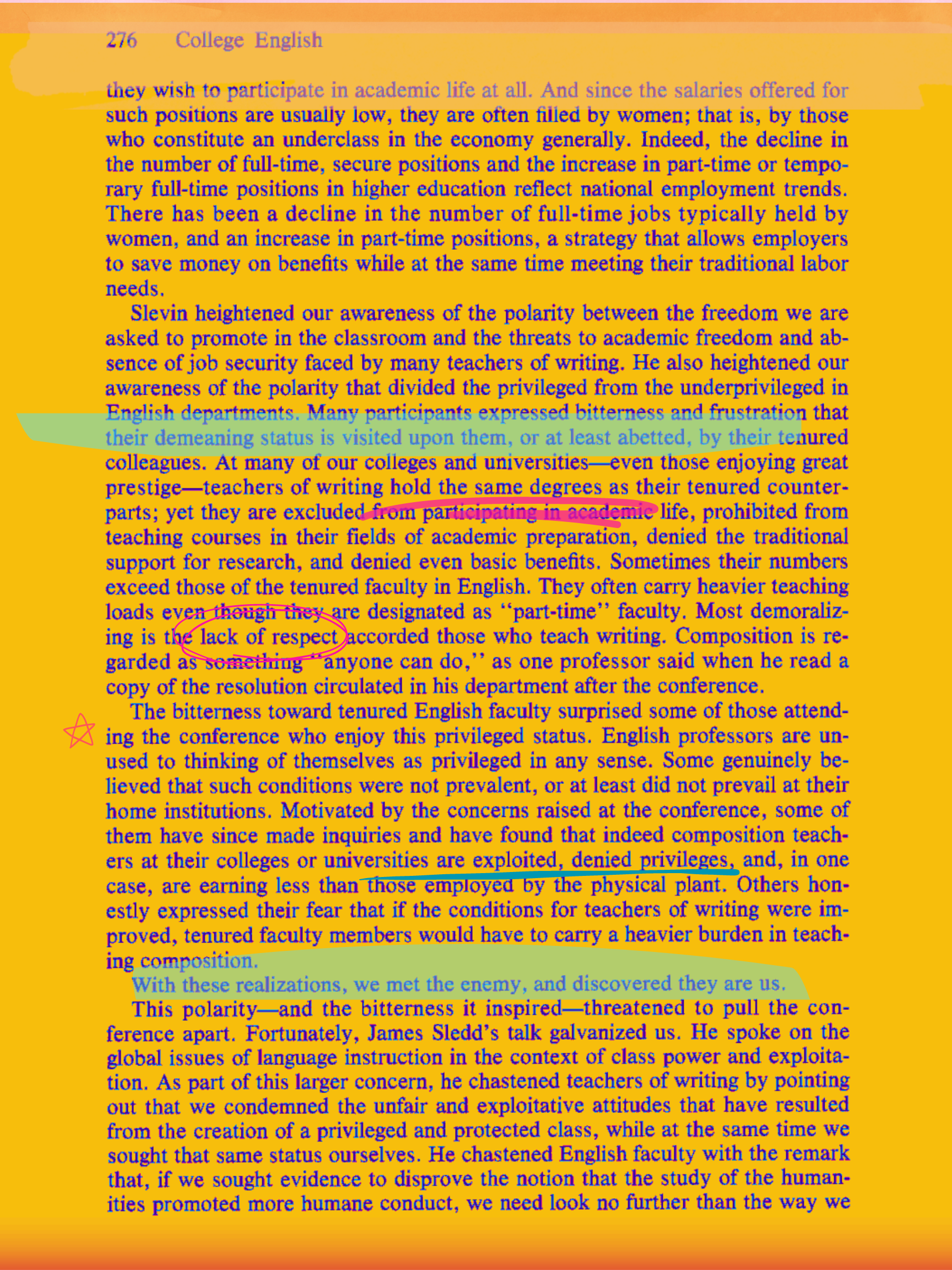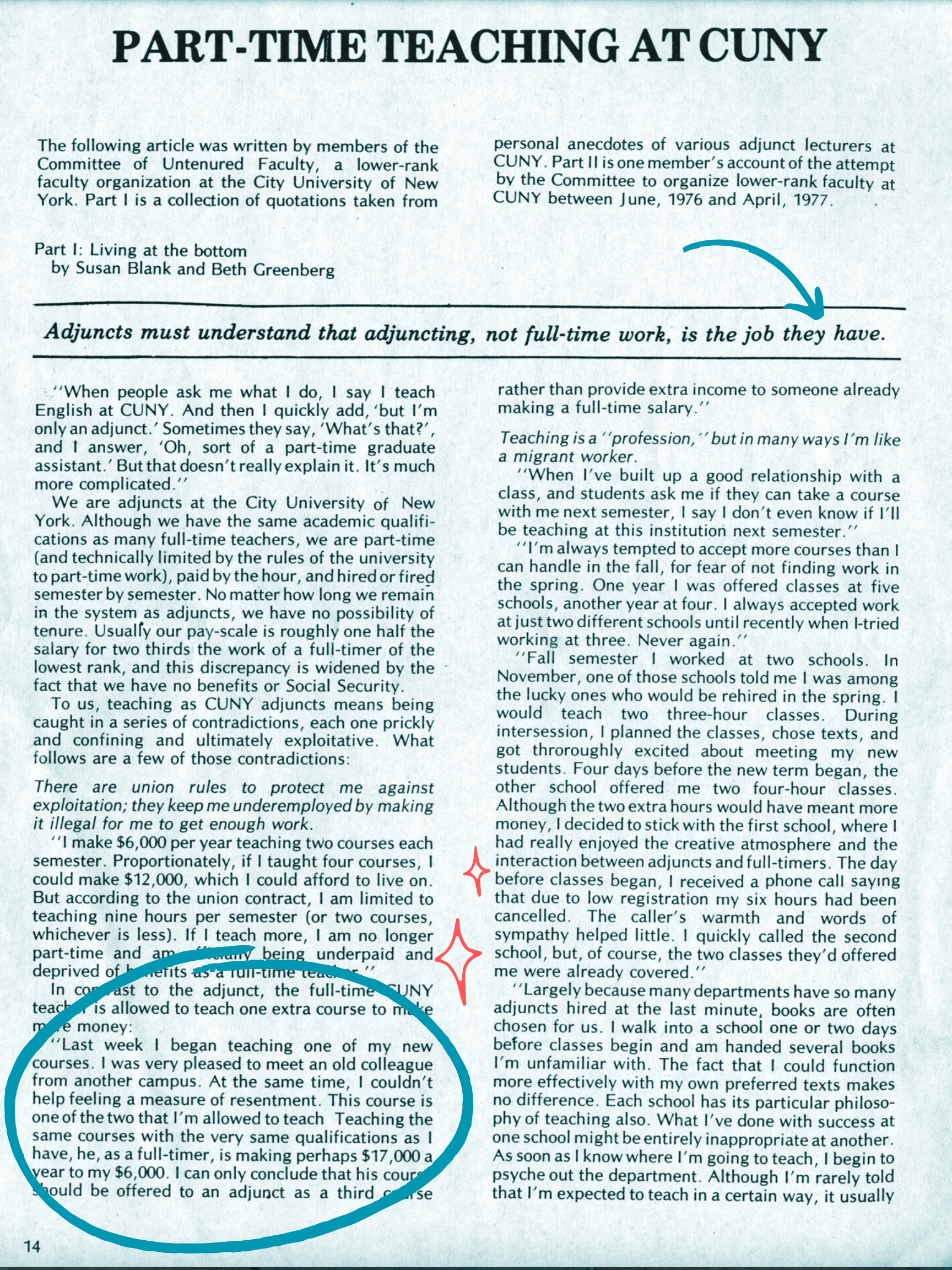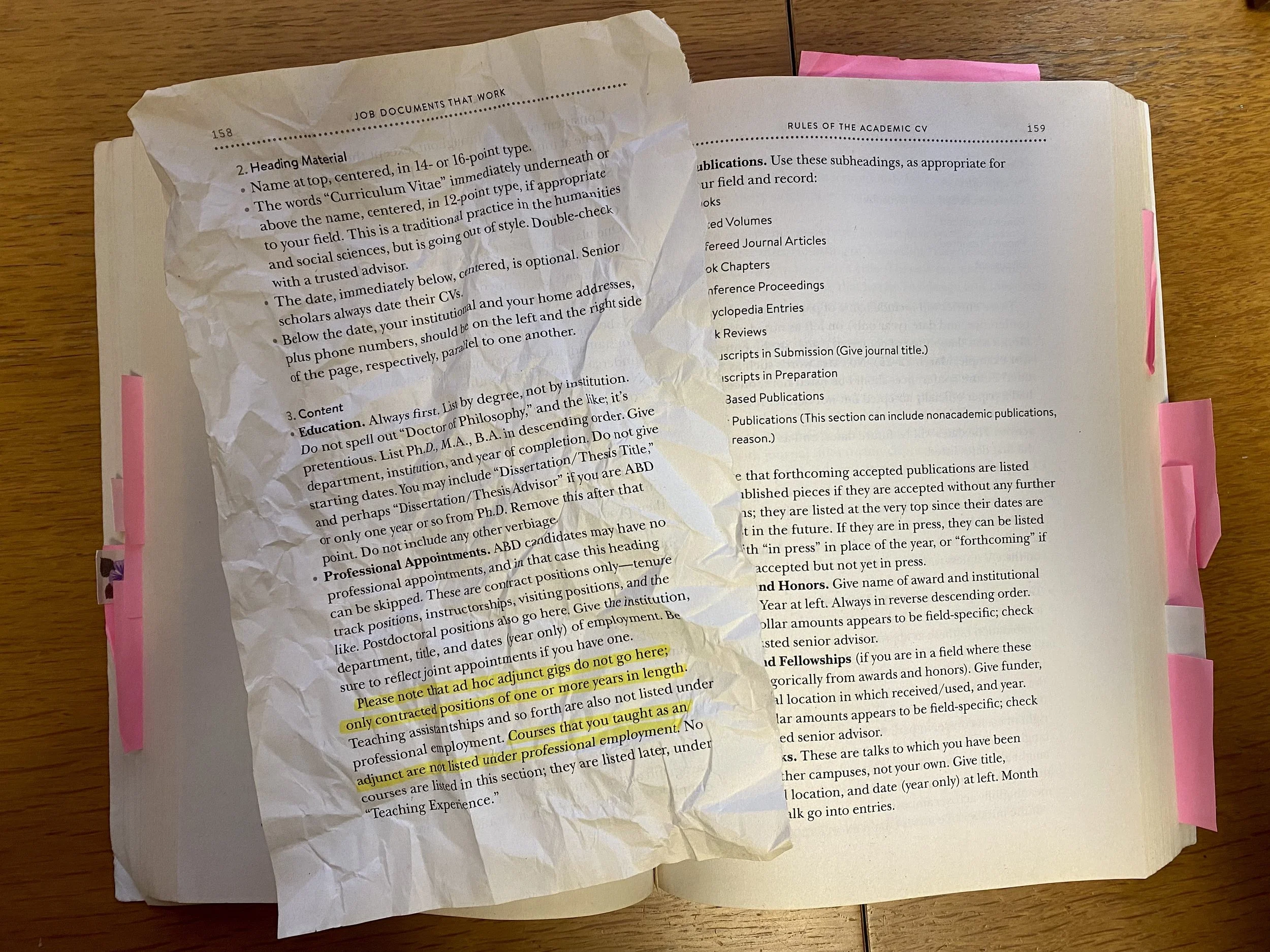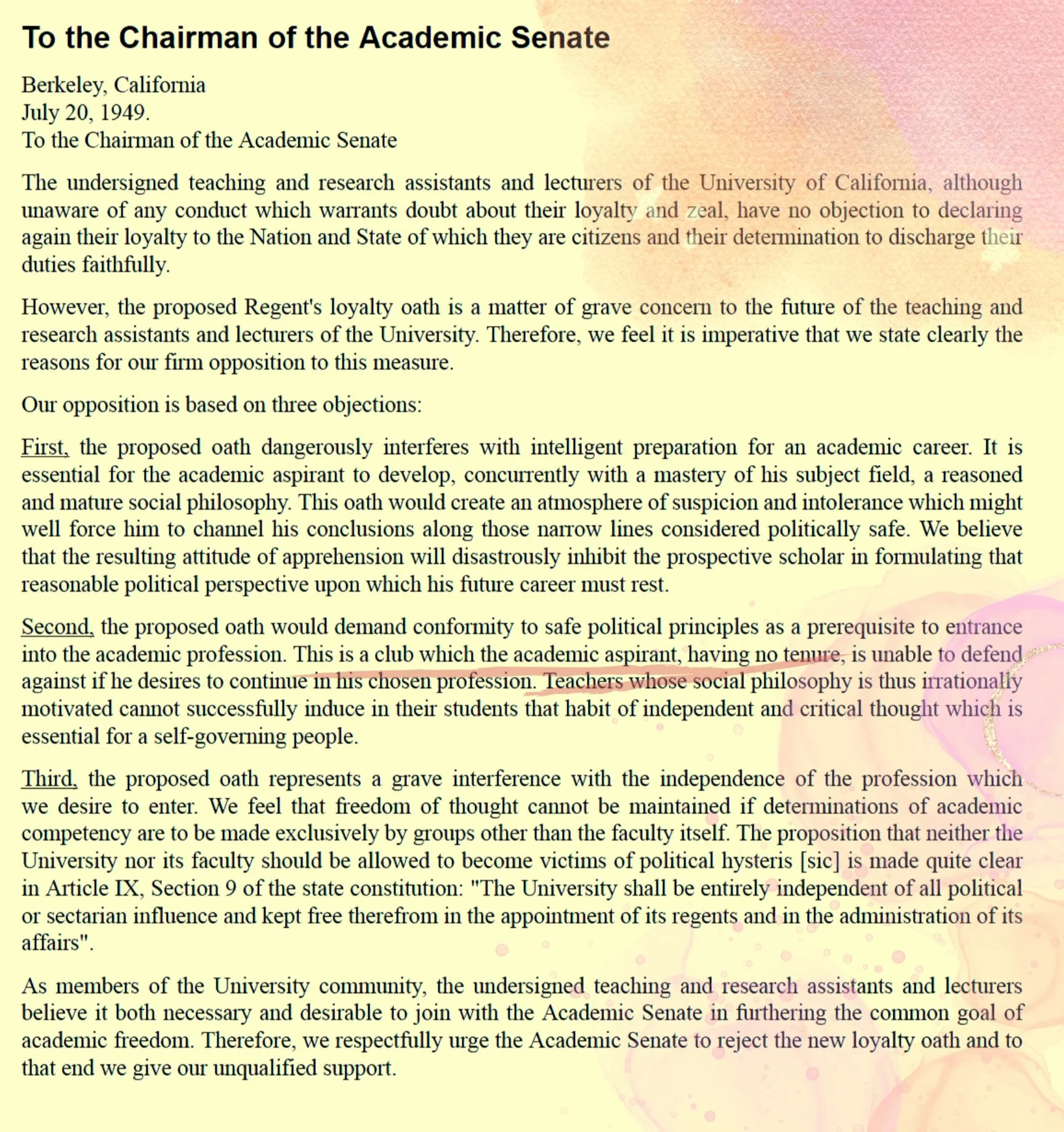Adjuncts are historically significant.
This in-progress digital project asserts that adjuncts are historical actors who have made significant contributions to their disciplines, students, and institutions. Contingent academics have existed for as long as academia has existed. Adjuncting should be historicized. Adjuncts are historically significant.
Academics often discuss adjunctification as a phenomenon created by the increasing corporatization of higher education or recount their own years of adjuncting as a temporary phase of “academic hazing,” something one gets through rather than something they consistently live within. This digital project seeks to engage the longstanding emotional and intellectual experiences of adjuncting. Adjuncts undertake labor not only in the classroom, but among our fellow academics as we fight for recognition of our significance.
The compilation of historical sources below highlights adjuncts’ reactions, political expressions, demands, and emotions—not only as participants in a gig economy or academic labor market, but as scholars, teachers, and humans.
Who are adjuncts? How has your life been shaped by adjuncts?
Engage with this site:
This page is equipped for social annotation using the open source annotation software, Hypothes.is. Visitors are encouraged to highlight and comment on the historical sources and descriptions by creating their own free username and joining the public conversation. The word cloud generated through the open-ended question box is available through Answer Garden.
The sources below are arranged thematically rather than chronologically to emphasize the lack of improvement or progress in the way academia has treated adjuncts over time.
Page from the Wyoming Conference Resolution, College English March 1987
With these realizations, we met the enemy, and discovered they are us
Wyoming Conference Resolution, 1986
The Wyoming Conference Resolution arose out of debates and conversations at the 1986 Conference on College Communication and Composition in Laramie, Wyoming. Linda R. Robertson, Sharon Crowley, and Frank Lentricchia published the resolution and a description of the conference in the March 1987 issue of College English.
Robertson, Crowley, and Lentricchia write:
Some of us were struck with the irony that those of us charged with this significant responsibility [enabling students to discover the freedom of self-expression] often feel unable to speak freely about the fundamentally unfair conditions under which we labor.
The authors quoted a comment from a (tenured) conference participant reckoning with the challenges posed by untenured and precarious attendees:
We don’t want to face our own roles in the problem, and how we—as people, as teachers, as “professionals”—are implicated in the very problems we’re trying to solve. Perhaps there is no solution. Perhaps nothing we can do as individuals, or even as a group, can do anything to mitigate the frightening direction that some of us see us going. But to ignore it—no. Not if we take ourselves seriously when we speak so glibly about making things better.
Jay Chafetz for the Triton Times, April 28, 1976. Source: UC San Diego Guardian Collection
Why Isn’t Great Teaching Enough?
“She is being fired instead,” 1976
Instructors like her are not a dying breed. They are a breed which has hardly been allowed to exist let alone flourish at this University.
In 1976, Eleanor Widmer, a lecturer in the Department of Literature at UC San Diego was not granted “security of employment,” the status (potentially) granted to adjunct lecturers in the University of California system after they have taught for a certain number of quarters. Widmer had taught courses at UC San Diego for seven years, and was widely beloved by students, as the quotes from the evaluations quoted in the Triton Times article attest. Her firing sparked an outrage and campaign among students, who published op-eds in student newspapers, wrote letters to administrators, and petitioned to have Widmer permanently retained by the department. In the article from April 1976 included here, Jay Chafetz writes:
I once believed that the University had something to do with students who attend it. Woe to the poor misguided mind of my youth. Yes, I have learned here. Four years have taught me that such ideas were fantastic illusions, the products of an imaginative if deluded mind.
After her departure from UC San Diego, Widmer taught writing and English courses at San Diego State University. She was a restaurant critic for the San Diego Reader from 1974-2000. Widmer died in 2004 and her novel, Up From Orchard Street, was published two years later, in 2006.
Article printed in Radical Teacher, by Susan Blank and Beth Greenberg, members of the Committee of Untenured Faculty at CUNY in 1976. Source: CUNY Digital History Archive.
The day before classes began, I received a phone call saying that due to low registration my six hours had been cancelled. The caller’s warmth and words of sympathy helped little.
Susan Blank and Beth Greenberg showcase adjunct experiences at CUNY, 1976
Blank and Greenberg’s article compiled quotes from CUNY adjuncts from 1976, which continue to encapsulate the adjunct experience, including pay inequity between tenure-line and adjunct faculty, the labor involved in securing enough classes to teach each term, and the lack of opportunity for community building on campus.
To us, teaching as CUNY adjuncts means being caught in a series of contradictions, each one prickly and confining and ultimately exploitative.
Most adjuncts and even instructors know that they are the menial workers of the university system. But our vision is clouded by a double image. The person who fills out an hourly time sheet and who may be laid off tomorrow if registration dips, may also, with a few lucky breaks, be an apprentice scholar on the verge of security, tenure, and advanced courses.
Ella Lonn, “Academic Status of Women on University Faculties,” Journal of the American Association of University Women 17, no. 1 (Jan-March 1924), 5. Source: Google Books / cited in Eileen Schell, Gypsy Academics and Mother-Teachers: Gender, Contingent Labor, and Writing Instruction (Portsmouth, NH: Boynton/Cook Publishers, Inc., 1998), 27-29.
(Low pay and much drudgery)
AAUW finds 72% of academic women are contingent instructors, 1924
Ella Lonn’s 1924 report in the Journal of the American Association of University Women revealed widespread gender discrimination across all types of colleges and universities, where women were underrepresented as faculty members and mostly concentrated at the rank of “instructor.” Lonn’s report also incorporated responses from department heads and chairs in Modern Languages, Social Sciences, and English, who responded to a set of survey questions. From the report:
One professor, however, comments caustically, “In positions of low salary, involving much drudgery, women do better than men, but solely because they are more nearly tied to the business of teaching than man.”
The charge of being good only at routine work is too serious not to challenge the careful thought of every woman teacher. One of our most noted thinkers and teachers condemned us as “too fond of school-keeping methods”; another passed judgment tersely in these words, “good drill-masters, rarely inspiring leaders.”
Eileen Schell cites this AAUW study in her critical assessment of the overrepresentation of women in contingent positions in college writing programs, especially those who “teach one of the only courses that is universally required of all college students and universally disdained by most tenure-line faculty: Freshman English.” [Gypsy Academics and Mother-Teachers, 1998, p. 16]
Excerpt from Marge Piercy, “Token Woman,” printed in The New Indicator, December 1976. Source: UC San Diego Student Newspapers Collection
Your department orders her from a taxidermist’s catalog
Poet Marge Piercy includes adjuncting in her description of the “token woman,” 1976
Featured in the December 1976 issue of the UC San Diego student newspaper, The New Indicator, alongside a review of the Common Women Collective’s Women in US History: An Annotated Bibliography, and quotes from Emma Goldman, Susan B. Anthony, and Alice Duer Miller, Marge Piercy’s poem, “The Token Woman,” reflected how feminist activism was incorporated into student conversations. Piercy’s sharp assessment of women’s roles in academia is not only a comment on their intellectual and pedagogical labor, but their reproductive and sexual labor as well. The text of the excerpt in the image above is transcribed below:
The token woman is a Black Chicana fluent in Chinese
who has borne 1.2 babies
(not on the premises, no child care provided),
owns a Ph.D., will teach freshman English
for a decade and bleach your laundry
with tears, silent as a china egg.
Your department orders her from a taxidermists’s
catalog
and she comes stuffed with goosedown
able to double as sleeping
or punching bag.
Karen Kelsky, The Professor Is In: The Essential Guide to Turning Your Ph.D. into a Job (New York: Three Rivers Press, 2015), 158-159, with my angry annotations and defacement.
Courses that you taught as an adjunct are not listed under professional employment
Applying for academic jobs as an adjunct, 2010s
In the chapter of her book, The Professor Is In, titled “Rules of the Academic CV,” Karen Kelsky describes what kinds of positions should appear under the “Professional Appointments” heading on the academic CV:
Please note that ad hoc adjunct gigs do not go here; only contracted positions of one or more years in length.
Courses that you taught as an adjunct are not listed under professional employment.
This standard guidance and advice for graduate students and new PhDs encapsulates the way academia devalues adjuncts’ labor as teachers, but also removes our positions (“ad hoc gigs”) from other positions of higher value and status.
Letter from UC Berkeley teaching and research assistants and lecturers to the Chairman of the Academic Senate opposing the loyalty oath proposed by the UC Regents. July 20, 1949. Source: Berkeley Library Digital Collections.
This is a club which the academic aspirant, having no tenure, is unable to defend against if he desires to continue in his chosen profession
Lecturers and graduate students at UC Berkeley oppose proposed loyalty oath, 1949
In March 1949, the president of the University of California proposed that all employees of the university, including faculty, sign a loyalty oath pledging that they were not members of the Communist Party. The UC Board of Regents approved the proposal, and immediately many faculty raised concerns about the oath’s potential infringement on academic freedom.
Half of the faculty had signed by the end of August 1949. The letter above was written by non-Senate academic employees, teaching and research assistants and lecturers, in July 1949. They framed their concerns about how the oath would undermine academic freedom both as members of the academic community at the university and as untenured and precarious academics who would have to conform to “safe political principles” in order to enter the profession.
As members of the University community, the undersigned teaching and research assistants and lecturers believe it both necessary and desirable to join with the Academic Senate in furthering the common goal of academic freedom.
Ellen Cantarow, “Academic Gore,” Radical Teacher 11 (March 1979): 15-16, 20.
“Save the chicks until last and hire them for Freshman Comp. They always need the jobs.”
Ellen Cantarow skewers the 1978 Modern Language Association conference, 1979
The March 1979 issue of Radical Teacher centered on “The Academic Profession 1968-1978” and featured essays on political activism, union organizing, affirmative action, and more. Ellen Cantarow’s account of the 1978 “Very Important” MLA meeting calls out two of the association’s “dirty secrets”: unemployment and misogyny. As the quote above reveals, these two dirty secrets went hand in hand.
Describing the job opportunities in 1978, Cantarow writes:
The computer printouts aren’t encouraging. They tell one that if one wants a job one had better go to Riyadh, Saudi Arabia, to Melbourne, Australia, or—if one wants a “one-year terminal appointment”—to Houston, Texas.
Cantarow printed the comment written on female candidate’s job application at a California state college, by an“Old Boy,” which plainly revealed the sexism built into the academic job market:
“She’s a medievalist. But do we need just another medievalist? Perhaps we should rule her out on the basis that she’s six feet high, rawboned and awkward.”








